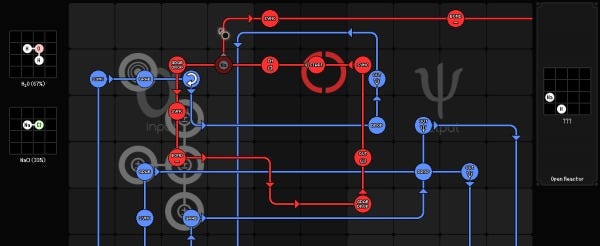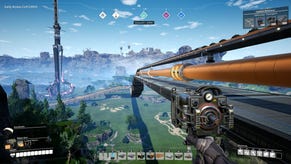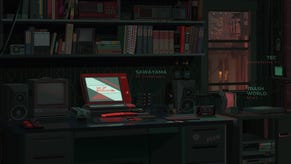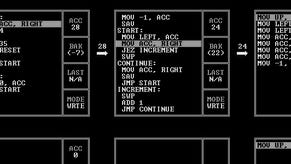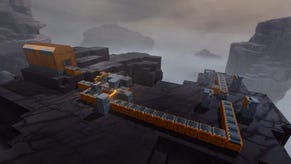My Chemical Romance: Zach Barth Interview
SpaceChem isn't simply the best indie game 2011's seen so far, it's one of the best puzzle games ever made. If you haven't yet partaken of the demo or my review then you certainly should. The game is predominantly the work of one Zack Barth of Zachtronics Industries, who describes the outfit as such: "In the pursuit of clandestine R&D objectives, Zachtronics Industries accidentally releases games from time to time." I infiltrated his hermetically sealed underground laboratory for a chat.
RPS: Hello! Could you talk a little about your background?
Zach Barth: I went to school for (and graduated with a degree in) computer science and engineering, but ended up focused on game development. I’ve always been more interested in making games then playing them, so it just clicked when I found myself with the technical skills and supportive environment to make it happen.
RPS: How would you describe yourself now?
ZB: Older, better dressed, and a little bit more experienced at making games.
RPS: Your puzzle games share a certain mechanic- "programming" out a sequence, namely. Would you call SpaceChem the culmination of what you've learned? Or are you more proud of something else?
ZB: I wouldn’t call SpaceChem the “culmination” of what I’ve learned, as that implies an apex which I hope I haven’t hit. That said, it’s definitely influenced by previous games I’ve made and hopefully the best so far.
RPS: Alright. And what is it about these mechanics that holds such appeal?
ZB: As humans, we’re wired for the kind of problem solving that games with these mechanics require. When done right they can be extremely satisfying, which makes it an appealing choice both to create and play.
RPS: We're wired specifically for laying out circuits?
I was referring more to problem solving in general. The combination of clear goals and well defined tools with lots of potential for emergent behavior creates an environment where you are constantly learning and discovering new things. This is something your brain rewards you for, not unlike World of Warcraft and its variable ratio rewards.
RPS: Zachtronics Industries must have plenty of new fans with the release of SpaceChem. Which of your games would you recommend people play next?
ZB: They’re pretty bad compared to SpaceChem, but the four listed on my site (The Codex of Alchemical Engineering, Ruckingenur II, The Bureau of Steam Engineering, and Kohctpyktop) are all good choices. Ruckingenur II even has live-action video!
RPS: The realm of absurdly taxing puzzle games - of which I consider SpaceChem an example of - seems unpopulated to me. Or am I not looking in the right place?
ZB: When I think about “puzzle games” I usually divide them up into a few categories, such as:
- pattern matching games, which require you to have eyes and a brainstem (Bejeweled);
- logic games, which present you with a situation that can be solved by deduction or other logic-based heuristics (minesweeper, sokoban, picross);
- rule-discovery games, which present you with a system and require you to figure out the rules (Myst, “escape the room” games, the Dismantlement series); and
- design-based games, which present you with a goal, perfect information, and a set of combinable tools to achieve it, possibly focusing on an emergent behavior that must be discovered or invented (SpaceChem, Manufactoria, Light Bot, other games I’ve made).
There is also a large category of games that employ programming mechanics but without the puzzle framework, such as Carnage Heart, at-robots, and corewar.
RPS: Carnage Heart! There's a game I'd forgotten entirely.
ZB: You can find “difficult” games in each of these categories, but I think that design-based puzzle games can be particularly taxing because, if done correctly, they’re essentially asking you to “invent” a solution to a problem instead of merely “finding” the solution. I agree with your assessment that there aren’t many, as I’ve only seen a handful in the past few years, although it’s quite possible that I’m not looking in the right places either!
RPS: I think the need to "invent" your solution rather than discover it is an excellent summary of SpaceChem's appeal. Could you talk a little about the process of inventing the puzzles themselves? Since I suppose you have to come up with both a solution and plenty of room for that solution to grow into something more awkward and unwieldy, I'd imagine it's somewhat taxing. What's your step-by-step process?
ZB: My process for inventing the puzzles in SpaceChem was to design the goals without any consideration of the solutions required. I wrote these all down on paper so that I could physically manipulate them, and then proceeded to sort them based on perceived difficulty and discard puzzles that were too similar to others (such as two puzzles with different molecules but essentially the same “complexity”).
Next, I entered them into the game and, after a combination of testing them myself and with other players, further modified and rearranged them to create a smooth and interesting difficulty curve from start to finish.
The above is an image of some of Zach's SpaceChem production notes, which I stuffed into my pocket when he wasn't looking. View the full things here and here
RPS: What frustrates you about game development?
ZB: The intangibility of fun can be frustrating sometimes, but I guess if it was clear then everyone would be making games!
RPS: When I think about standout puzzle games from the last couple of years- Braid, World of Goo, Limbo, and now SpaceChem- they all share a very high standard of storytelling, audio and aesthetics. Is it the case that when you have a great set of puzzles on your hands, you want to deliver them in a suitably impressive framework? What's your reason for giving SpaceChem a story at all?
ZB: I think that aesthetics and gameplay are equally important in games, and work together to create the best experience possible. SpaceChem has a story because I felt it needed one and I had one that I wanted to tell.
RPS: Could you talk a little about what inspired you to design Infiniminer?
ZB: Infiniminer is a combination of Infinifrag, Team Fortress 2, and Motherload. I wanted to make a competitive mining game, and this was it.
RPS: What led to the decision that you were finished with Infiniminer, and that you wanted to return to your trademark puzzle games?
ZB: I stopped working on Infiniminer when the source code was leaked. It was totally my fault, as that’s what I get for releasing an un-obfuscated .NET assembly, but it nevertheless enabled hackers to create hacked clients and players upset with my balancing decisions to fork and write their own clients and servers.
In the months after the leak, I thought a lot about how and why I made games in the past. It became obvious to me that if I wanted to make better games and reach more people, I needed to step it up. I assembled an awesome team, cranked up the polish, and made a game that happened to be SpaceChem.
RPS: I'd imagine that creating the precursor to the million-selling MineCraft would raise conflicting emotions. Do you ever lie awake at night, howling into your pillow?
ZB: The act of borrowing ideas is integral to the creative process. There are games that came before Infiniminer, and there are games that will come after MineCraft. That’s how it works.
RPS: Are you one of the many, many gamers who doesn't see the entertainment value in simply building and landscaping this blocky world for the sake of it?
ZB: Hell no; I think it’s terrific. That’s why I made a game about it!
RPS: Thanks for your time.
All of Zach's games discussed in this article can be found here, except Infiniminer. You'll find that here.
